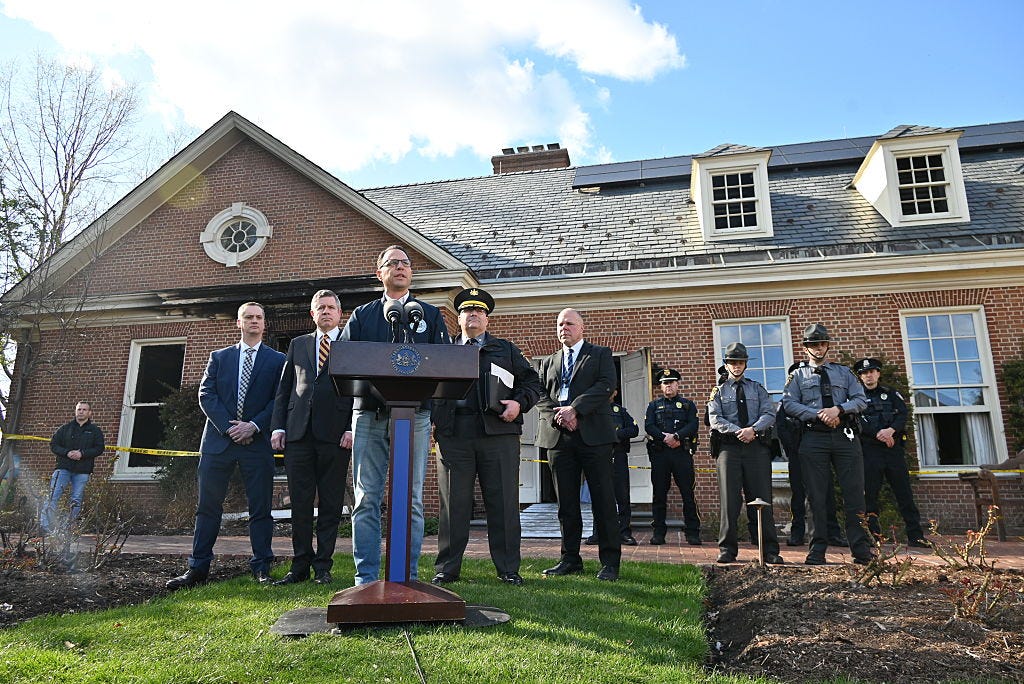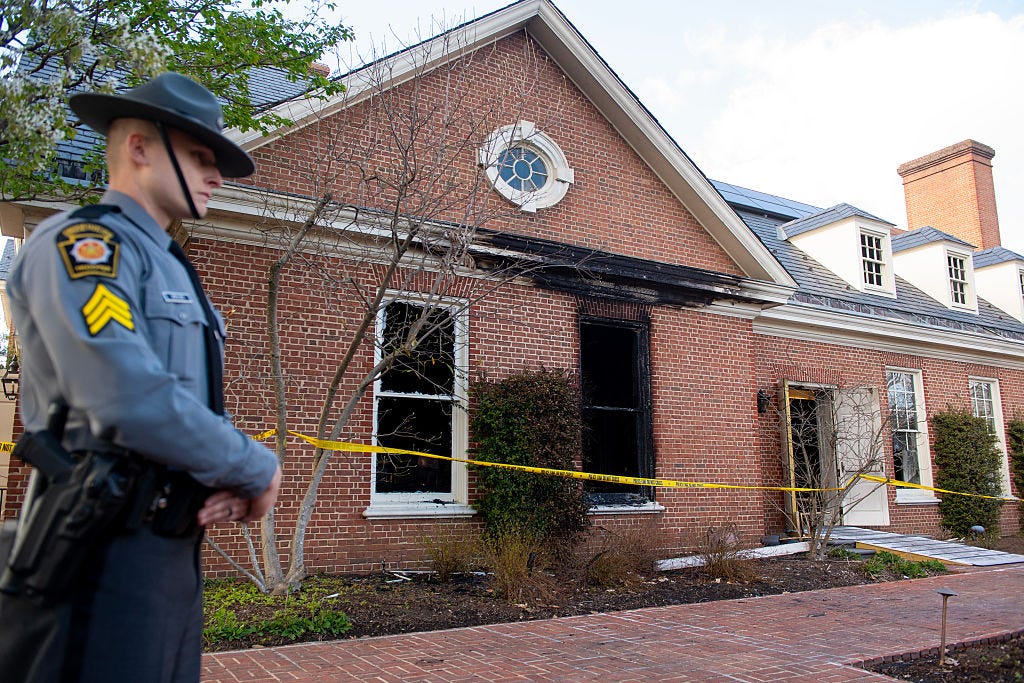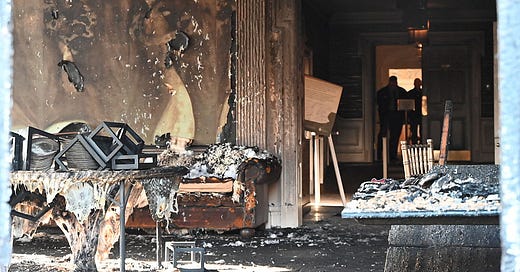
The Free Press

When Governor Josh Shapiro and I spoke on Saturday afternoon about a potential data center investment in Pennsylvania, he ended the call by noting that he needed to go prepare for an 80-person seder which he was leading. Less than 12 hours later, he and his family were evacuated from the governor's residence, because an arsonist had set it on fire.
The pictures of the damage to the residence are horrifying. Yet even more frightening is the trend that this attack is a part of. And if left unchecked, this trend—of using political violence to settle our differences—has the potential to destroy our republic.
According to an affidavit filed by the Commonwealth of Pennsylvania on Sunday, the alleged perpetrator, Cody Balmer, admitted to “harboring hatred” towards Governor Shapiro. Balmer said that if he had found Shapiro, he would have beaten him with his hammer. And the timing of this crime in the very place where the Shapiros were observing Passover should leave us all deeply troubled.

No matter the motivation, it’s important for all Americans to recognize that the demonization of political opponents and those with whom we disagree must stop. I made this same argument after witnessing the terrible near-assassination of President Trump and murder of Corey Comperatore in Butler, Pennsylvania.
Shapiro is a Democrat. I’m a Republican who supports President Donald Trump. But this isn’t a moment for partisanship. It’s time for all Americans to disown, condemn, and make every effort to stop political violence. And we must likewise call on our political leaders to avoid language that vilifies those on the other side.
When political figures or activists characterize a person or group as irredeemably evil, they plant a poisonous, dangerous seed. As violent language becomes more pervasive, our political system will slip further past the boundary between honest, even intense political disagreements, and nurturing a climate of demonization and violence.
Take your pick of recent examples.
Tesla cars and dealerships have been vandalized and set on fire amid accusations of Elon Musk being a danger to the republic.
Nine Democratic lawmakers said that they received bomb threats on around last Thanksgiving.
Jewish Columbia University students were attacked and physically blocked from going to class and a janitor was held against his will during the occupation of Hamilton Hall, amid anti-Israel protests at Columbia that saw calls to kill Zionists and “crush Zionism” “by any means necessary.”
The alleged assassin of a United Healthcare executive was celebrated as a hero standing up against the supposed injustices of private health insurance.
An assassination plot against a Supreme Court justice was foiled two years after a United States Senator stood on the court’s steps claiming justices had “unleashed the whirlwind.”
The list goes on.
I am sure there will be those who overlook the demonization when it’s their “side” doing it. But the truth is that no side has a monopoly on violence and the rhetoric that can incite it. Partisans may wave away my examples on the left or the right in favor of their own examples.
But the pattern is right in front of us. Some call it incitement, and others, stochastic terrorism. Whatever the name, we must call out the radical rhetoric and political violence that we have all witnessed over the course of this decade. I am doing so now, specifically at this moment, when the violence is directed at my governor, not in spite of the fact that he and I disagree on many things, but because we do.

There have been periods where political violence became commonplace in America. During and soon after the Vietnam War, for example, left-wing terror groups such as the Weather Underground bombed numerous government buildings, including the State Department’s headquarters. It would be folly to think this trend is new; however, the rhetoric and deed pointing towards or justifying violence against those with whom we disagree has become impossible to ignore.
If history is our guide, Abraham Lincoln’s first inaugural best represents the spirit that has preserved our republic and offers the best hope for our future:
“We are not enemies, but friends. We must not be enemies. Though passion may have strained, it must not break our bonds of affection. The mystic chords of memory, stretching from every battlefield and patriot grave to every living heart and hearthstone all over this broad land will yet swell the chorus of the Union, when again touched, as surely they will be, by the better angels of our nature.”
We must all remember that attempts to injure or kill lawmakers and public officials, regardless of motive, are attacks on democracy itself. We need to make sure our conduct as leaders, particularly those of us who serve in public office, gives Lincoln’s better angels a chance across our land.
Political leaders should remind us of the basic truth that we are citizens of the same great nation with shared values and a shared history. As we fight for our visions of the future, we must do so without demonizing our opponents, by avoiding venomous language that paints as evil those with whom we disagree, and by unambiguously condemning violence as a means for resolving our differences.
When did political violence become mainstream? In this episode of Breaking History, Eli Lake unpacks the movement behind Luigi Mangione and the unsettling phenomenon of turning killers into icons:




